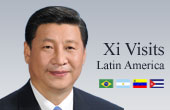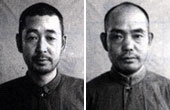Timing of Abe's visit to Latin America sparks debate
By Zhang Fan (China Daily Latin America) Updated: 2014-08-11 03:52Just two days after Chinese President Xi Jinping finished his visit to Latin America on July 23, Japanese Prime Minister Shinzo Abe landed in Mexico to start his 11-day visit to the region.
The timing of Abe's trip has aroused global interest because of the cold relationship between China and Japan. Scholars and the media are asking the same question: Did Abe chose the time on purpose?
Sankei Shimbun and Nikkei Japan Review, two major Japanese media outlets, shared the analysis that Abe's visit to Latin America was designed to strengthen Japan's influence in the area and to counter growing Chinese power in the region.
Moreover, Japan's national media Kyodo International News, reported on July 27 that a leaked draft of the joint statement of Brazilian President Dilma Rousseff and Abe shows that Brazil will support Japan in its territorial disputes with China.
The report has since been proven to be untrue, as the joint statement from the two leaders released on Aug 1 does not mention a single word about the issues. "Brazil's diplomatic theory is that try not to interfere directly in subjects that do not have a direct impact on Brazil's interests,"said Danielly Ramos Becard, a professor at the Institute of International Relations at the University of Brasilia.
"I don't think Brazil will take a stand to defend China or Japan because Brazil thinks it would lose diplomatic credit by doing so,"she said.
Becard's idea is echoed by Severino Cabral, director-president of the Brazilian Institute for China and Asia-Pacific Studies.
"Certainly there is the attempt from Japan's current leadership to gather support among the countries of Latin America as to its interest in the dispute with China in East Asia,"said Cabral. "But these interests do not cover the essential and joint interests of Brazil and other Latin American countries, which are undergoing rapid regional integration to build a new southern mega market.”
During President Xi's visit to Brazil, the two countries signed 56 cooperation documents involving the economy, culture, science, education and people exchange with a total value of about $8.6 billion.
After years of development, China is now Brazil's largest trade partner worldwide and also its largest international export market. The bilateral trade amounted to over $90 billion last year.
On the other hand, even though Japan has enjoyed a much longer relationship with Brazil and the region, its trade with Brazil was only about $15 billion last year, and it is now the fifth largest market for Brazilian exports.
"Brazil and other regional countries enjoy a great potential market of over 600 million consumers and are endowed with great natural resources, so that Japan and other industrialized countries want to keep strong ties with the area,"said Cabral.
"As Japan has, due to several factors, greatly diminished its presence in Brazil and Latin America, it is natural that now it wants to return and resume a more important position," he added.
Abe's trip marked the first visit for a Japanese prime minister to Latin America in 10 years. He expressed his eagerness to boost Japan's economic and trade ties with four Latin American nations including Brazil during his stay in Sao Paulo.
"Japan is a traditional partner of Brazil but the relationship hasn't been fruitful in recent years,"said Becard. "Even so, Japan has many technological investments in Brazil and China should learn from Japan in this aspect so that the bilateral relationship can be more confident.”
"Brazil is trying to diversify its partners as much as possible,"she said, adding that the only element that will influence Brazil is "who can provide better cooperation and who is quicker, especially for Dilma Rousseff's government, which is much more pragmatic compared with the past”.










